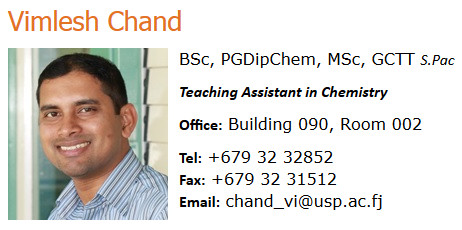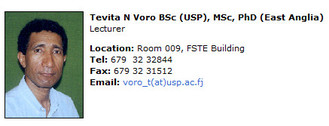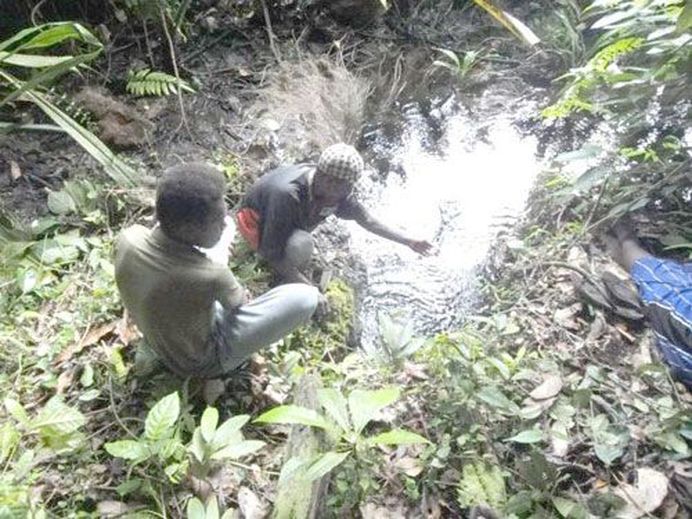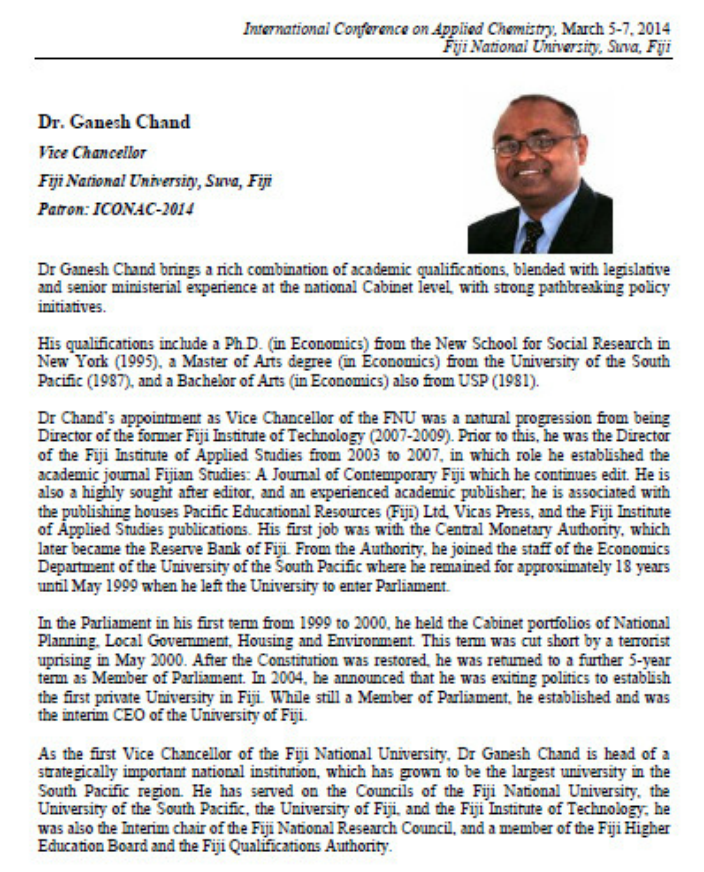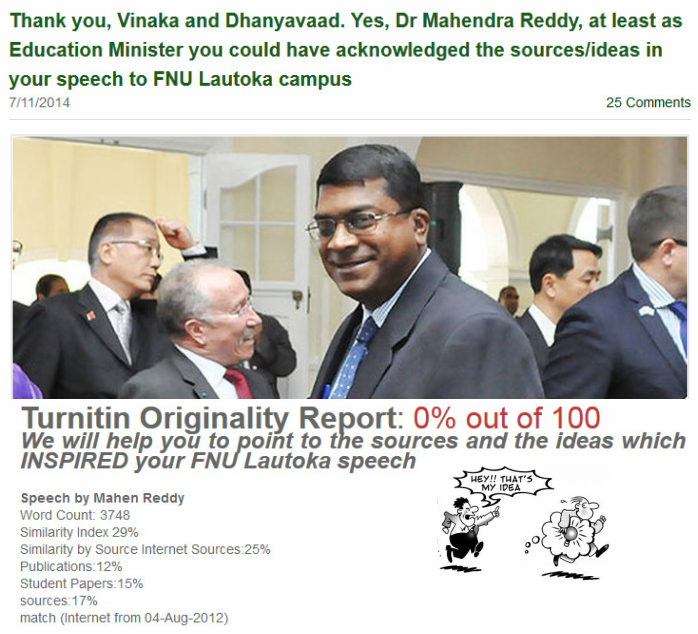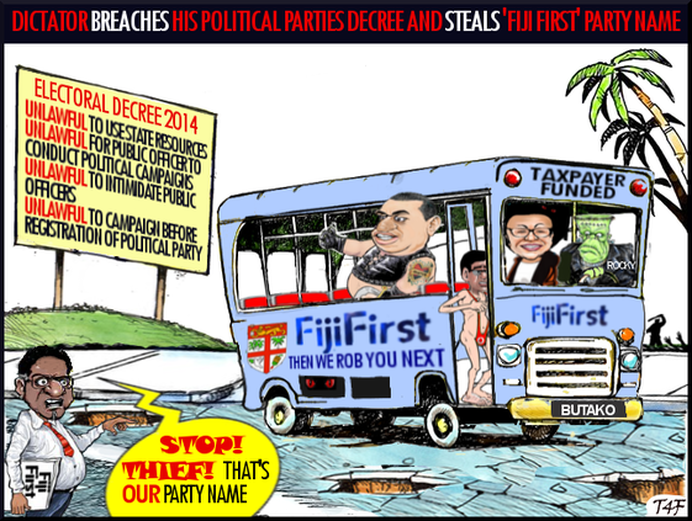RESPONDING to the Directive from VC Rajesh Chandra to all at USP to keep "scandals and scams" hidden from the media and the general public (see Dictatorship at USP, Fijileaks), one disgruntled staffer has sent us the following, wanting to know WHY the accused lecturers are still being allowed to strut around the campus teaching as if NOTHING has happened at all - what has happened to the Plagiarism Investigation Report?: "Fijileaks, Fiji media is sleepwalking.You are our only hope to fight injustice and hypocrisy."
ROBBED OF HIS BREAKTHROUGH DISCOVERY ON POTENTIAL CURE FOR DIABETES AND CANCER: "The investigation that was undertaken had “proven beyond doubt” that the three Professors, including one from a university in South Africa had plagiarised [my] work. I was never acknowledged for the work. But every data that they presented was the same as all the data I had in my databank. They simply didn’t have any original data.These three professors and a PhD student were just about to publish my work in an international publication when we found out. We promptly stopped the publication of my work...I won’t rest until the Vice Chancellor has announced the penalty against the offending professors”
Dickson Boboria, the young Solomon Island's Scientist

It all began last year when Solomon Islands science student, Dickson Boboria of Malaita made a discovery that holds the potential for the cure of diabetes and cancer.
According to on-Campus sources, Mr. Boboria approached the USP Science Department to buy him a machine so he could conduct his experiment. The USP Campus denied the request on the grounds the machine was “very expensive.”
It did not deter young Boboria.
Boboria turned to a simple syringe to prove his initial findings that peanuts have medicinal properties for the cure of cancer and diabetes. The tests confirmed the discovery to the point that Boboria’s work was only one step away from manufacturing tablets for trialing.
Boboria provided all the data and a report on his discovery to his professor. He returned to Honiara to do some part time work in order to pay for the costs associated with his work.
Without his knowledge, his Professor allegedly got together with three others including one from Australia and published his work without his knowledge or his permission. Two other Professors, Prof Vimlesh Chand and Surendra Prasad presented Boboria’s work at a regional conference held at the Fiji National University (FNU) last year.
Boboria was never acknowledged for the work. Instead, the four Professors allegedly claimed the work was theirs.
As soon as the issue of plagiarism became known last year, Professor Tevita Voro, resigned on the pretext of getting a new job in South Africa. One other Professor allegedly involved in plagiarizing Boboria’s work had also left for the United States.
Plagiarism is a serious crime, according to USP rules and By-laws.
Now the USP Administration, which refused to invest any money into Boboria’s initial work is putting pressure on the student to enter a contract which would hand-over the rights or patent for the discovery to the USP.
Boboria has reportedly refused USP’s request to sign over his work to the USP.
Sources said the USP is also begging young Boboria not to go to the media about this, as the alleged involvement of the Professors in plagiarism would tarnish the image of the regional institution.

THE UNIVERSITY of the South Pacific (USP) has launched an investigation into a media report carried in this paper accusing USP Professors of stealing a local student’s work.
The front page report accused USP of trying to put a lid on serious allegations of plagiarism being leveled against four of its science professors for stealing the work of young Dickson Boboria of Malaita, who made a discovery that holds the potential for the cure of diabetes and cancer.
In a statement sent to the Island Sun, USP said it has taken the complaint seriously which has gone through the Preliminary Investigation Committee (PIC) phase, which is the first stage of investigating such grievances at the University. USP said the findings of this Committee is confidential to the person(s) bringing the case and the staff member(s) concerned. “In this case, the student will be informed of the outcome and the reasons for their decision as soon as the process is completed. “The University wishes to reiterate that it places a lot of emphasis on academic staff complying with all ethical policies, procedures and regulations, and within the accepted professional protocols for their discipline, in particular, academic staff are required to be fair in giving due credit in publications to the research work of and other contributions from students under the staff’s supervision. The University said it would like to assure the general public and their stakeholders that USP has Policies and Procedures on such matters and it will address issues such as this expeditiously and relay the outcome to the parties concerned.
According to on-Campus sources, Mr. Boboria approached the USP Science Department to buy him a machine so he could conduct his experiment. The USP Campus denied the request on the grounds the machine was “very expensive.” It did not deter young Boboria. Boboria turned to a simple syringe to prove his initial findings that peanuts have medicinal properties for the cure of cancer and diabetes. The tests confirmed the discovery to the point that Boboria’s work was only one step away from manufacturing tablets for trialing. Boboria provided all the data and a report on his discovery to his professor. He returned to Honiara to do some part time work in order to pay for the costs associated with his work.
Without his knowledge, his Professor allegedly got together with three others including one from Australia and published his work without his knowledge or his permission. Two other Professors, Prof Vimlesh Chan(d) and Surrendra Prasad presented Boboria’s work at a regional conference held at the Fiji National University (FNU) last year. Boboria was never acknowledged for the work. Instead, the four Professors allegedly claimed the work was theirs.

In an exclusive interview with the Island Sun newspaper on the weekend, Boboria who is working towards his MSc, said despite assurance from the USP Administration that an announcement on the penalty against the Professors was imminent, nothing has been forthcoming.
“Each time I inquired HR (Human Resources department) keeps telling me it will be next week. It just goes on forever,” he said. “In the end I simply told them I am returning to Solomon Islands.” Mr. Boboria arrived last week.
He thanked Island Sun newspaper for breaking the story last October, saying had it not been for the courage the paper has taken in exposing the report, his fight against the USP establishment would remain under the carpet. In his view, regional politics has taken over his case. But I won’t rest until the Vice Chancellor has announced the penalty against the offending professors,” Mr. Boboria said.
He said plagiarism is the number one offence at the USP. “Any student caught plagiarising someone’s work is automatically dismissed. I want to see what penalty the professors would receive,” the young Malaita scientist said.
Boboria said the investigation that was undertaken had “proven beyond doubt” that the three Professors, including one from a university in South Africa had plagiarised his work.
“I was never acknowledged for the work. But every data that they presented was the same as all the data I had in my databank. They simply didn’t have any original data.”
“These three professors and a PhD student were just about to publish my work in an international publication when we found out. We promptly stopped the publication of my work.”
Boboria’s work was on peanut which he discovered has the potential for curing cancer and diabetes. He was only a step away from turning his discovery into manufacturing tablets for trialling when he ran out of money. Boboria said he had the scientific expertise for turning many herbal medicine that are in use in Solomon Islands into drugs, which can bring in billions of dollars into the economy. “All I need is a scientific laboratory to do my work. I just hope that the Government recognises my work and do something about it because we have the potential for producing our own medicine,” Boboria said.
"thks for exposing the rot and hypocrisy at USP. VC Rajesh Chandra has been boasting about the systems and processes at USP and complaining about staff resorting to external avenues to lodge grievances. well,here is an example of why staff do not trust the VC or the USP system.
Someone wrote VC manipulates the system to protect favoured staff. ONE staff who plagiarised a students work and presented it as his own is walking and working around USP as normal. This is despite usp promising to investigate the matter. To the contrary,the staff received an award at the VC's research awards ceremony recently.
I have provided a link to the awards night usp ceremony article. in the picture, the alleged plagiarizer is standing next to dean angela jokhan.he is wearing glasses. The plagiariser also sent out a call for papers(see email below) and will continue teaching.How can a staff who is being inve4stigated for plagiarism be allowed to do this?
The staff concerned,assoc. prof surendra kumar, is deemed a high volume researcher so his dean angela jokhan and the VC are protecting him. this is the kind of false image USP's reputation is built on.
USP is employing double standards - students are taken to task for plagiarism but certain staff get away with it. This is just one example of how the VC and his cronies like angela manipulate the system and deceive the public. I hope you draw attention to this. Fiji media is sleepwalking. you are our only hope to fight injustice and hypocrisy.
see the following: USP launch investigations http://www.islandsun.com.sb/index.php/latest-news/national/7003-usp-launch-investigations
USP Celebrates Research Excellence with Research Awards Evening
http://www.research.usp.ac.fj/?p=1603
Photo of Dr Prasad: http://www.usp.ac.fj/index.php?id=6764
(Research and Graduate Affairs) PAPER SUBMISSION INVITATION: Vol. 33, 2015
The South Pacific Journal of Natural and Applied Sciences (SPJNAS) invites the original research articles, review articles, short communications and book reviews in all areas of pure and applied sciences. We expect that the work submitted for publication has not been published before, except in the form of an abstract, and it is not under consideration for publication elsewhere.
The SPJNAS is a peer-reviewed journal published by Commonwealth Scientific and Industrial Research Organization (CSIRO), Australia, on behalf of the Faculty of Science, Technology and Environment, The University of the South Pacific. The primary purpose is to enable the timely communication of information on scientific research carried out mostly on Pacific matters and contribute to the development of Pacific Science and Technology. However, any work of specific or general interest and implications to the Pacific region from anywhere in the world will be considered for publication, and authors based in countries outside the region are also encouraged to submit the papers.
Please submit soft copy of your paper (in MS word, one file including Tables, Figures, etc.) to the Editor-in-Chief– Associate Professor Surendra Prasad ([email protected]). You may also submit your paper directly to Associate Editors in your disciplines. The Associate Editors, e-mail contacts, and instructions to the authors are given on the CSIRO website (please visit http://www.publish.csiro.au/nid/248/aid/9971.htm).
Note: 1. Last date for submission of research articles for publication in Vol. 33 is 28th February 2015. 2. The SPJNAS charges AU$50 per page for publication of paper if paper goes beyond 4, 8 and 12 formatted pages for short communication, full paper and review article respectively. 3. For USP purposes (Outputs and Awards), the Research Office has accepted SPJNAS as B-ranked journal.
Kind regards,
S. Prasad Assoc.
Prof. Surendra Prasad Chair (Editor-in-Chief), SPJNAS Editorial Board, Associate Professor of Chemistry, School of Biological and Chemical Sciences, Faculty of Science, Technology and Environment, The University of the South Pacific, Suva, Fiji
Fijileaks: We have asked all those accused in articles in the Island Sun (Honiara) and in the e-mail to Fijileaks for comments but so far we have received no comments.


